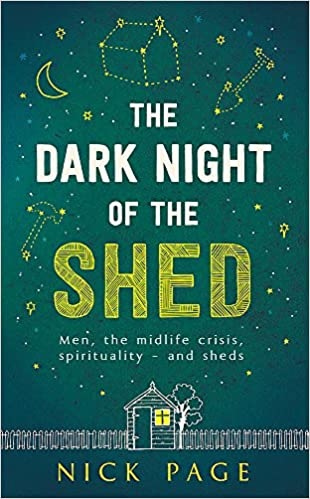Nick Page, in his book on midlife crises, Dark Night of The Shed, interviews two unnamed church leaders who explain how difficult church can be during this time of life.
The first:
“It feels horrible, as a church leader. It feels horrible that you can’t be honest. Because this is a stage when you’re feeling very vulnerable and very tender and you can’t.”
The second:
“My experience is that church becomes a worse and worse place. At first you just love it. You like worship, you like small groups, you like sermons, you like everything.
But after a while, you realize that stuff doesn’t really transform your character. You’re receiving a lot of information, but not transformation.
At it is the lack of transformation that becomes so dissatisfying at this stage of life.”
*****************************************************************
End quotes.
Of course, those experiences aren’t universal, but the reason I post that excerpt from Page’s book is that those experiences are almost universally hidden.
So you’re not alone if you’re finding yourself struggling with church — at midlife, or any part of life.
I’ve found there’s so much clutter to the expression of American Christianity, and in that clutter, we can lose Christ.
Not our salvation, but our experience of it.
And that tends to be worse at mid-life, when everything seems to get more cluttered.
Suddenly, the limitless possibilities of youth are stopped cold by the limited certainties of age.
As Page writes, the German term for “mid-life crisis” is Torschlusspanik, which is “door-shut-panic.”
You used to have all the time in the world to do all the things in the world.
Now you just have an afternoon, and you can only really do a few things, and the double-gut punch is that they’re not the things you really want to do.
Everyone eventually feels this. Christian or not.
And we feel guilty because Christians are never supposed to be in crisis. We’re supposed to be the ones who help those in crisis.
And we do help those in crisis. But we have crises of our own, because we’re as human as anyone else.
And the sad thing is that acknowledging, “I’m having a mid-life crisis” implies that you marriage is on the rocks, your spirituality is faltering, and you’d like to have an affair.
So we shut up about it, and too often then, shut down on life.
Page writes: “Many middle-aged men feel split in two: there is a vast difference between the person we present to the world and the one who lies awake at night.”
I write this on Sunday morning, and you probably went to church today, but last night, you were maybe wondering why in the world you were going to go to church again tomorrow morning, and you couldn’t let anyone know you were wondering why.
You didn’t even tell God you were wondering why, even though he knew it.
And I’m convinced the reason you wonder why is because the clutter of middle age can barely handle the clutter of church.
The melancholy nostalgia of middle-age can barely handle a church that seems fundamentally opposed to any expression of melancholy or nostalgia.
So what do we do?
A few quick ideas.
Remind ourselves that Christ is the opposite of clutter. And you can find him, like the thief, by just looking towards him on the cross you share, forgetting everything around you. The madness of the crowds, the noise, all that life that suffocates life.
And you focus on the simplicity of the Gospel.
And then what about that melancholy nostalgia?
Well, that’s still something I’m working on.
It’s just always going to be there, because that’s how I’m wired. Some aren’t. They just press forward without any instinct or desire to look back.
I envy them.
But for me, there’s one thing I’ve started doing to deal with that nostalgia.
As I see something I want to do, something that youth would allow and maybe once did, — I tell God, “In the kingdom, I’d like to do that, go there, be that.”
To be trite, my BUCKET list isn’t for this life. It’s for paradise.
It’s a way of truthfully telling God about our unfulfilled longings in life, while looking forward to the next one.
Some might think that selfish — to long for a paradise where we’ll finally find the life we wanted. But Jesus seemed to think we’d be pretty pleased.
And the God who died so you could experience that paradise — well, that’s got to be something else, doesn’t it.
But in the meantime, a therapist or psychiatrist can help you grapple with some of these things.
So as always, I’ll end with:
Find a psychiatrist here.
Find a therapist here.

